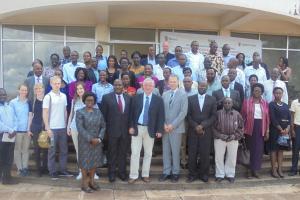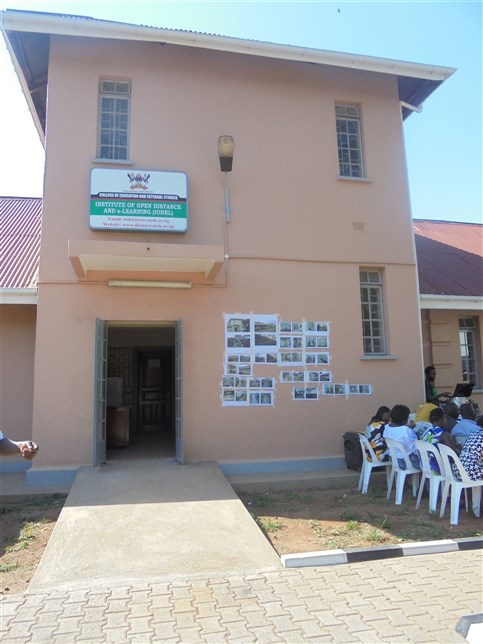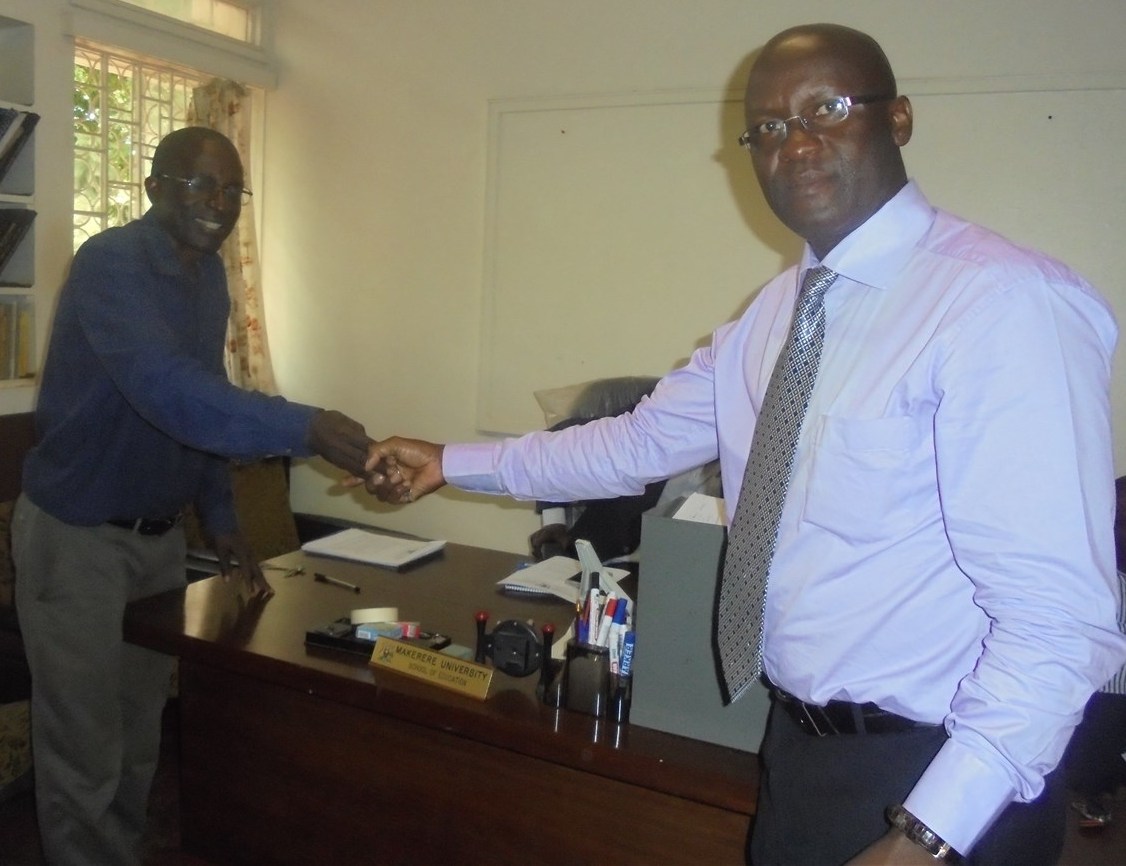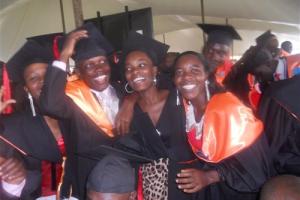Makerere University has received a boost to its Open, Distance and e-Learning from a donation of e-Teaching 1 (The International Online Tutor Course) and e-Teaching 2 (E- Course Development and Implementation) courses from the University of Agder, Norway. The announcement was made by Prof.Sven Åke Bjørke from the University of Agder during the Distance Education Leapfrogging Project Annual Research Workshop held on 2nd May 2016.
The e-Teaching courses, tenable online from the University of Agder (UiA), have been given to Mak to adapt them to its situation. “Makerere University now requires all teaching staff to take up a course in online/blended learner focused education. As a partner university to UiA, Makerere University may adapt the E-teaching courses and run them as its own courses. This will enable Mak to run its first e- teaching pilot course one year from now,” said Prof. Bjørke. Twenty out of 40 Mak staff have received hands-on experience of online teaching and learning through the e-teaching courses. On completion of the courses, staff are able to develop their own e-learning courses and effective and updated e-books to be used as learning resources in academic programmes.
The DELP is aimed at increasing access to flexible quality education at Makerere University by increasing capacity to integrate ICTs into pedagogical processes through leapfrogging the current 1st generation distance education provision into 4th and 5th generation distance education provisions.
The DELP Annual Research Workshop organized by the School of Distance and Lifelong Learning and the Institute of Open, Distance and E-Learning was held at the School of Food Technology, Nutrition and Bio Engineering Conference Hall under the theme, “Utilizing Emerging Educational Technologies to Leapfrog Distance Learning.”
While opening the workshop, the CEES Principal, Dr Fred Masagazi Masaazi thanked the University Council for passing the Open, Distance and E- Learning policy and the University Management for its support to DELP. “I take this opportunity to thank the University Council for appreciating the need to have the ODeL policy and for elevating the Department of Open and Distance Learning into the Institute of Open, Distance and eLearning,” he said. “We have developed an implementation plan for the policy and very soon a stakeholders meeting will be held,” Dr Masagazi said.
Dr Consolata Kabonesa, the Vice Chairperson NORHED Institution Development Committee (NIDIC) applauded the DELP team at Mak and UiA for disseminating the project results through the annual research workshop. “As NIDIC we are proud to see that the projects mooted under our backyard have begun to bear fruits,” she said.
Dr Paul B Muyinda, the DELP Project Principal Investigator and Coordinator at Mak, reported that the project was increasing the capacity to integrate ICTs into pedagogical processes. “The DELP has developed the first ever online/blended learning programmes, namely: the Bachelor of Youth Development Work (BYDW) and Master in Instructional Design and Technology (MIDT). These programmes are supposed to be the seed online learning programmes at Mak and will be benchmarked by other programmes in order to roll out online learning,” he said.
He reported that other project activities have included; the development of human resources capacity through supporting three staff to pursue their PhD studies, the procurement of a number of ICTs to kick start online learning, the refurbishment of the former AVU room to a video conferencing facility, refurbishment of Nsubuga block (home of the Institute of Open, Distance and eLearning). The CEES Lira Centre is being remodelled to become the hub of distance learning in Northern Uganda.
Prof. Ghislain Maurice Isabwe, the DELP Coordinator at UiA gave the Norwegian perspective of the DELP project. He highlighted the importance of student mobility and noted that the Norwegian Government was investing more into increasing student mobility schemes to internationalize and harmonise programmes. A number of students at UiA have benefited from the DELP project as it have given them an international experience. He reported that UiA is planning to start a digital university and Mak is placed to provide expertise in pedagogies. He observed the need for sustainability of project activities and how to create opportunities for generating funds to procure state of the art equipment.
Prof. Stefan Rodheim from Dalarna University, Sweden, delivered the first keynote address on the Dalarna University experience from a campus university to an online/blended university. He stated that the large number of innovative teachers inclined to change, the strong pedagogical support organization, the strong support from the university management including provision of funds and the focus on synchronous, collaborative ways of education were instrumental in the transformation to online/blended learning.
Prof Rodheim highlighted the role of the Next Generation Learning Centre (NG) in distance education at Dalarna. “The NGL is responsible for developing the pedagogical skills to help teachers improve their skills, teaching and learning in higher education, evaluating and creating tools, manages several platforms and supports other units in various ways. We have 12 lecture rooms with automatic systems for streaming and recording lectures. These lectures rooms have video chat facilities where online students are able to ask their lecturer questions whilst the lecture is going on,” said Prof. Rodheim. Students and staff are also able to have a seminars/meetings on the unique meeting portal. Staff can record video lectures in the studio.
The second keynote address was made by Prof. Sven Åke Bjørke on, “Education for change and Transformation.” He noted that educational systems can no longer be content disseminating static information to be absorbed and regurgitated for an exam. “A transformative pedagogy is needed. Information literacy, critical thinking, creativity, intercultural communication and collaborative teamwork are key factors,” he said.
Collaborative learning promotes deep understanding and skills in contrast to superficial learning. However, collaborative learning, especially in online contexts, can be challenging for many learners who do not have sufficient experience in such methods. They therefore need solid support from someone who is there to keep the discussion on the right track, monitor students’ contributions and prompt their thinking in case of challenges.
He stated that efficient online tutoring, the ability to develop rich digital learning environments and choosing the most relevant pedagogical approach for the learners to reach the intended learning outcomes are essentials in any education of the future.
A total of 19 paper presentations were made by speakers from Makerere University, University of Agder and Uganda Management Institute. These presentations will be upgraded into book chapters.
In the next two years the project will see the recruitment of students into the BYDW and MIDT programmes, completion of PhD studies, award of a Postdoc research grant, authoring and presentation of conference and journal articles, an international conference to be held in the fifth year, hosting of an online journal in ODeL, the operationalization of the CEES Lira study centre and the cascading of the knowledge and skills acquired by staff trained on the DELP to the rest of the staff in the University. DELP is one of the 13 projects at Makerere University supported by NORAD’s NORHED Programme.





